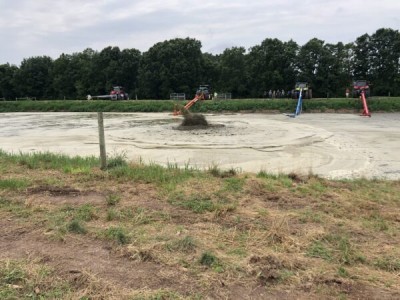Manure Management - The Safety Aspect

By Dan West, NYCAMH
This subject really stinks but it needs to be addressed. Many aspects of manuremanagement are causing more concern now than ever before because of environmental issues. This is not the only concern, though. It became painfully evident just a few weeks ago right here in New York State that by-products of manure can be lethal.
What does the average herdsperson or farm manager need to know about manure management so he or she does not become a fatality statistic? What we call "manure gas" is actually several gasses produced by the decomposition of manure. These toxic gasses include methane, carbon dioxide, ammonia, hydrogen sulfide and hydrogen disulfide. Most of these gasses are heavier than air so they will accumulate in low areas such as a manure pit. Methane, on the other hand, is lighter than air, so it will accumulate in the top of a storage area if it is enclosed. Gas levels are usually higher when the stored manure is being agitated, ventilation systems are not working, and during hot, humid weather.
Because manure gasses are invisible and inconsistent, you can't tell by looking or by past experience if a pit is safe to enter. Even a nearly empty manure pit can contain toxic fumes, or the oxygen may be displaced so there is not enough to support life. So what if
you have to enter the manure pit? If you have not had specific training in confined space entry, don't go in - it could be the last thing you ever do! Call the experts that have self-contained oxygen supplying breathing apparatuses and safety lines and harnesses. Even if a family member falls in a manure pit, resist the urge to go in after them. Call for help. A few years ago in Michigan five family members died, one by one, as they attempted to rescue the one that went in before them. These deaths could have been avoided.
For safe manure management observe the following precautions:
• Always post warning signs around manure storage areas.
• Fence lagoons to keep children out. (Even though the surface may look solid, a child
can fall through.)
• Do not allow people or animals in buildings above manure pits while agitating.
• Provide maximum ventilation when agitating or pumping manure from a pit.
• Never enter a pit unless you have specialized training, equipment and the assistance
of another person.
• Do not completely fill the pit. Leave space above the manure for gasses to
accumulate.
• Make sure repairs and maintenance can be done on your system without going into
the pit.
• Do not try to rescue a person who has been overcome by manure gas - immediately
call for help giving specific information about the nature of the hazards.
Don't assume that because you can't smell or see any gas, or because you have gone in before, that it is safe to enter a manure pit or storage tank. If you would like more information about manure gas and reducing your risks when working around it, contact
NYCAMH at 1-800-343-7527.
Upcoming Events
Northeast Grazing and Livestock Conference
January 30 - January 31, 2026 : Northeast Grazing and Livestock Conference
Manchester, NH
100% VIRTUAL OPTIONS AVAILABLE! This is the largest conference of its kind in New England and New York, bringing together over 300 farmers, graziers, educators, and service providers from across the Northeast. Over two days, we'll take a deep dive into topics specific to raising pasture-based livestock in our region
Boots in the Barn: Cornell Dairy Research Updates
January 13, 2026
January 20, 2026
January 27, 2026
February 3, 2026
February 10, 2026
February 17, 2026
February 24, 2026
Join us for some or all!
Winter Field Crops Meeting
February 3, 2026 : Winter Field Crops Meeting
North Collins, NY
Join Laing-Gro, Division of Timac and Cornell Cooperative Extension for a Winter Field Crops Meeting. DEC and CCA credits are available!
Announcements
Cows, Crops & Critters Newsletter Sponsorship
TRYING TO REACH GROWERS AND AGRIBUSINESSES IN OUR SOUTHWEST REGION OF NEW YORK?Weekly Email Update: Shared with 625+ households who have signed up with our program.
Monthly Paper Mailer: To reach our stakeholders and farmers who lack internet access, we send out a monthly mailer where your company's logo and contact information would be featured with a mailing list of 330+ households.
If you sponsor our weekly and monthly publications you reach approximately 955 households.





